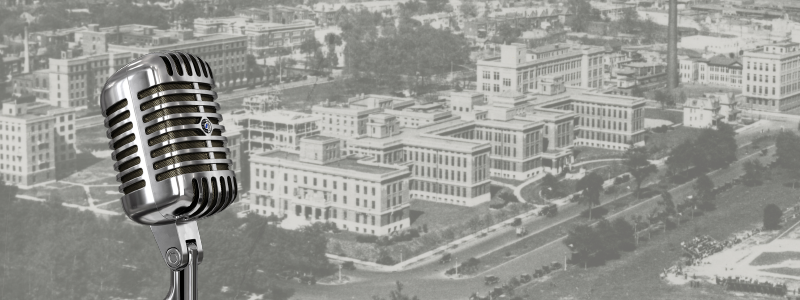
Washington University School of Medicine Oral Histories

Samuel B. Guze Oral History
Interviewer
James Carter and William M. Geideman
Loading...
Summary
Samuel B. Guze was interviewed by James Carter on July 23, 1990, for approximately 49 minutes. Guze discusses his experience with segregation and desegregation at the Washington University School of Medicine and its affiliated hospitals.
Scope and Content
Samuel Guze discusses his experience with segregation and desegregation of Barnes Hospital, Renard Hospital, as well as its psychiatric service and unit. He guesses the psychiatric service desegregated the Barnes Hospital psychiatric unit in October 1953.
He describes the desegregation of Washington University School of Medicine. He says the Executive Faculty gave the admissions committee discretion in flexible criteria for admission for those with disadvantaged educational background. Roy Vagelos of biochemistry was a key player on the executive faculty along with John Herweg, who headed the admissions committee starting in the early 1960s.
Guze recalled that the first African American medical student admitted had difficulty and the second had no difficulty, but the Executive Faculty wanted more African Americans admitted and numbers did not start to go up significantly until about 1968. Guze says this was due to the hiring of Robert Lee, Assistant Dean for Minority Affairs.
Guze discusses the parallel but related desegregation of the St. Louis City Hospital and health care systems. He notes that the segregated city healthcare system included two large general hospitals, Homer G. Phillips Hospital for Blacks and the older St. Louis City Hospital No. 1 for whites. He explains that there was one psychiatric unit at the Malcolm Bliss Center for whites and a separate psychiatric unit for Blacks run by Black psychiatrists at Homer G. Phillips. Guze recalls the teaching arrangement with Homer G. Phillips was less complete and depended on personal relationships in each service. Guze notes that desegregation of both facilities led the city to evaluate whether the city needed two large general hospital complexes.
A group of Black physicians approached Guze in the 1970s about an affiliation, but Guze insisted on conditions that Homer G. Phillips was not prepared to meet then, including the right to appoint medical staff.
Biographical Information: Interviewee
Samuel B. Guze (1933-2000) was born in New York City in 1923. He completed his undergraduate coursework at the City College of New York, and later attended Washington University School of Medicine, receiving his medical degree in 1945. Guze began his career at Washington University as an Assistant Professor in the Department of Medicine in 1953. In 1955, he also became an Assistant Professor of Psychiatry. Guze is best remembered as one of the founding fathers of the scientific approach to psychiatry.
In the 1950s he propagated the view that psychiatric illness should be diagnosed just as any other physical illness through the use of a scientific model and a biological approach.
In addition to his scientific accomplishments, Guze is also recognized for the leadership abilities he demonstrated while holding several important administrative positions at Washington University. He served as the Assistant to the Dean from 1965 to 1971. He was appointed Vice Chancellor and President of the Washington University Medical Center in 1971, a position he held until 1989.
Guze presided over the school during a time of rapid expansion and changes in medical care and research. Additionally, he was head of the Department of Psychiatry from 1975 to 1989, and again from 1993 to 1997. In all, he served on the faculty for almost 50 years. Guze passed away on July 19, 2000.
Biographical Information: Interviewer
James Carter is an anesthesiologist who received his bachelor's from Washington University in 1989 and graduated from Washington University School of Medicine in 1993.
William M. Geideman is an orthopedic surgeon who graduated from Washington University School of Medicine in 1993. He completed his internship and orthopedic residency training at Barnes-Jewish Hospital.
Interview Date
1990-07-23
Collection Identifier
OH102 (PC054-S05)
Length
Approximately 49 minutes.
Restrictions
Users wishing to publish (in whole, or in part) content taken from the audio or transcript of this oral history interview must request, sign, and return a Statement of Use form to the Becker Archives. For detailed information regarding publication and use of this oral history, contact the Becker Archives (arb@wusm.wustl.edu).
Recommended Citation
Samuel B. Guze Oral History, OH102 (PC054-S05), Bernard Becker Medical Library Archives, Washington University in St. Louis.
Disclaimer
The Becker Archives provides access to this oral history interview as a record of the past. This interview reflects the attitudes, perspectives, and beliefs of the interview participants, which may reflect outdated, biased, and offensive views and opinions. The Becker Archives does not endorse the views expressed in this interview, which may contain materials offensive to some users.



